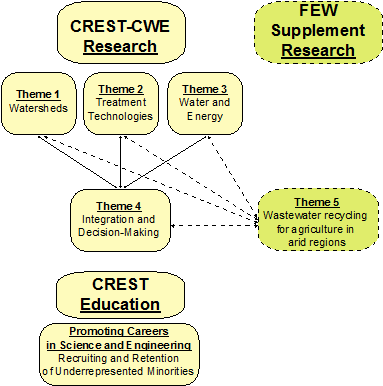Recent News
Grant Rudnick named Breece Award recipient
December 2, 2025
UNM wins demo award at International Workshop in Structural Health Monitoring
December 2, 2025
Ferenchak named chair of Transportation Research Board Pedestrian Committee
October 31, 2025
Ferenchak named APBP 2025 Research Professional of the Year
October 1, 2025
News Archives
The Center for Water and the Environment gets NSF Funding for Developing Research on the Food, Energy and Water Nexus in New Mexico
September 10, 2015
Food, energy, and water (FEW) are linked in a nexus with complex synergies and tradeoffs. Scientists and engineers need to provide holistic solutions that address these complex interactions in order to conserve energy and water while guaranteeing water quality for downstream users. Dr. González-Pinzón and Dr. Schuler led a successful NSF proposal ($298,449) seeking to add an additional research theme to the UNM Center for Water and the Environment (CWE). The supplement will leverage an existing $5 million grant from the NSF Centers for Research Excellence in Science and Technology (CREST) program, led by Dr. Kerry Howe. The CREST-CWE currently conducts research related to water and energy, and this supplement will add a food component, as shown in the figure. Additional UNM faculty participating in the supplement grant are Dr. Van Horn (Dept. of Biology) and Dr. Cerrato (Dept. of Civil Engineering).

The new research theme “wastewater recycling for agriculture in arid regions” seeks to understand how we can expand the supply of water to agriculture through wastewater recycling and improved management decisions between wastewater treatment plants (WWTPs) and water conservancy districts in arid regions. In developing this theme the researchers heed calls to help resolve the growing competition between the demands of freshwater resources for urban and agricultural uses, particularly in arid and semi-arid, densely populated regions. Therefore, the new research theme will provide scientific knowledge to support the transformation of traditionally ‘linear’ societies (which treat intake water, use it, and then treat the wastewater and disposed of it directly in rivers), into ‘recycling’ societies capable of making productive gains in water use and reuse while minimizing environmental pollution. More information on the CWE is available at cwe.unm.edu.
